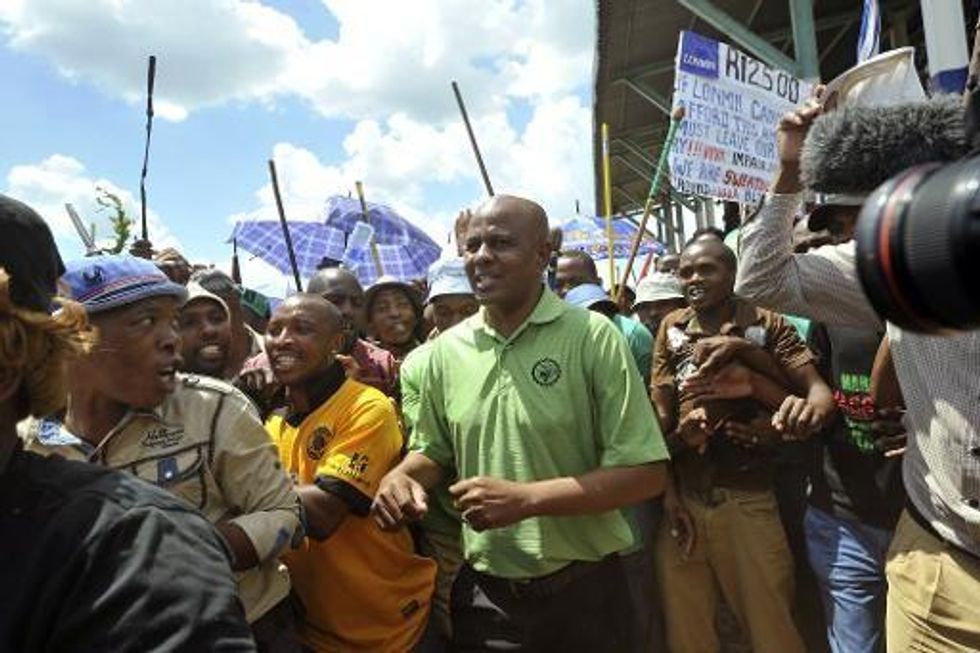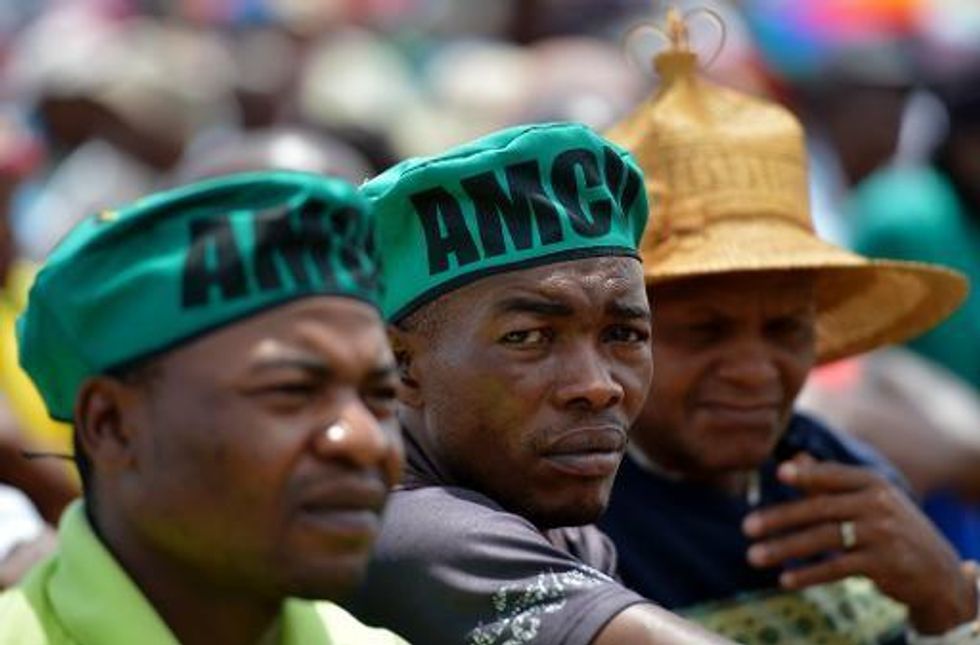

SUBSCRIBE TO OUR FREE NEWSLETTER
Daily news & progressive opinion—funded by the people, not the corporations—delivered straight to your inbox.
5
#000000
#FFFFFF
To donate by check, phone, or other method, see our More Ways to Give page.


Daily news & progressive opinion—funded by the people, not the corporations—delivered straight to your inbox.

Members of the Association of Mineworkers and Construction Union (AMCU) withheld labor from the top three producers of platinum -- Anglo American Platinum, Impala Platinum and Lonmin -- in what they say is an indefinite strike until their demands are met.
"This is a revolution of the economy of South Africa, to benefit all who live in it," AMCU president Joseph Mathunjwa told reporters following a mass protest at a football stadium, Reuters reports.
The AMCU, which is the largest representative of platinum mine workers in South Africa, is demanding what it calls a "living wage" of 12,500 rand (1,150 U.S. dollars) a month -- double the current monthly minimum wage.
South Africa's platinum mining industry, which accounts for 70 percent of global production, is notorious for its low pay and dangerous working conditions.
This is reportedly the largest strike South Africa has seen since 2012 when 34 striking miners in Marikana were massacred by South African security forces. Despite the killings, these workers stayed on strike, winning key demands and contributing to a surge of labor organizing and protest across the country's industries.
A majority of the platinum workers on strike work deep beneath the earth's surface as operators of rock drills, the BBC reports.
The strike has forced the massive platinum producers to the table for talks that will be mediated by Labour Minister Mildred Oliphant, according to Bloomberg. Yet workers say that the strike is not over until they declare it so.
"We are paid peanuts. And the cost of living is too high," said one striker at an Amplats mine who did not wish to be named, according to Reuters. "If they don't meet our demands, we will keep striking."

______________________
Dear Common Dreams reader, The U.S. is on a fast track to authoritarianism like nothing I've ever seen. Meanwhile, corporate news outlets are utterly capitulating to Trump, twisting their coverage to avoid drawing his ire while lining up to stuff cash in his pockets. That's why I believe that Common Dreams is doing the best and most consequential reporting that we've ever done. Our small but mighty team is a progressive reporting powerhouse, covering the news every day that the corporate media never will. Our mission has always been simple: To inform. To inspire. And to ignite change for the common good. Now here's the key piece that I want all our readers to understand: None of this would be possible without your financial support. That's not just some fundraising cliche. It's the absolute and literal truth. We don't accept corporate advertising and never will. We don't have a paywall because we don't think people should be blocked from critical news based on their ability to pay. Everything we do is funded by the donations of readers like you. Will you donate now to help power the nonprofit, independent reporting of Common Dreams? Thank you for being a vital member of our community. Together, we can keep independent journalism alive when it’s needed most. - Craig Brown, Co-founder |

Members of the Association of Mineworkers and Construction Union (AMCU) withheld labor from the top three producers of platinum -- Anglo American Platinum, Impala Platinum and Lonmin -- in what they say is an indefinite strike until their demands are met.
"This is a revolution of the economy of South Africa, to benefit all who live in it," AMCU president Joseph Mathunjwa told reporters following a mass protest at a football stadium, Reuters reports.
The AMCU, which is the largest representative of platinum mine workers in South Africa, is demanding what it calls a "living wage" of 12,500 rand (1,150 U.S. dollars) a month -- double the current monthly minimum wage.
South Africa's platinum mining industry, which accounts for 70 percent of global production, is notorious for its low pay and dangerous working conditions.
This is reportedly the largest strike South Africa has seen since 2012 when 34 striking miners in Marikana were massacred by South African security forces. Despite the killings, these workers stayed on strike, winning key demands and contributing to a surge of labor organizing and protest across the country's industries.
A majority of the platinum workers on strike work deep beneath the earth's surface as operators of rock drills, the BBC reports.
The strike has forced the massive platinum producers to the table for talks that will be mediated by Labour Minister Mildred Oliphant, according to Bloomberg. Yet workers say that the strike is not over until they declare it so.
"We are paid peanuts. And the cost of living is too high," said one striker at an Amplats mine who did not wish to be named, according to Reuters. "If they don't meet our demands, we will keep striking."

______________________

Members of the Association of Mineworkers and Construction Union (AMCU) withheld labor from the top three producers of platinum -- Anglo American Platinum, Impala Platinum and Lonmin -- in what they say is an indefinite strike until their demands are met.
"This is a revolution of the economy of South Africa, to benefit all who live in it," AMCU president Joseph Mathunjwa told reporters following a mass protest at a football stadium, Reuters reports.
The AMCU, which is the largest representative of platinum mine workers in South Africa, is demanding what it calls a "living wage" of 12,500 rand (1,150 U.S. dollars) a month -- double the current monthly minimum wage.
South Africa's platinum mining industry, which accounts for 70 percent of global production, is notorious for its low pay and dangerous working conditions.
This is reportedly the largest strike South Africa has seen since 2012 when 34 striking miners in Marikana were massacred by South African security forces. Despite the killings, these workers stayed on strike, winning key demands and contributing to a surge of labor organizing and protest across the country's industries.
A majority of the platinum workers on strike work deep beneath the earth's surface as operators of rock drills, the BBC reports.
The strike has forced the massive platinum producers to the table for talks that will be mediated by Labour Minister Mildred Oliphant, according to Bloomberg. Yet workers say that the strike is not over until they declare it so.
"We are paid peanuts. And the cost of living is too high," said one striker at an Amplats mine who did not wish to be named, according to Reuters. "If they don't meet our demands, we will keep striking."

______________________